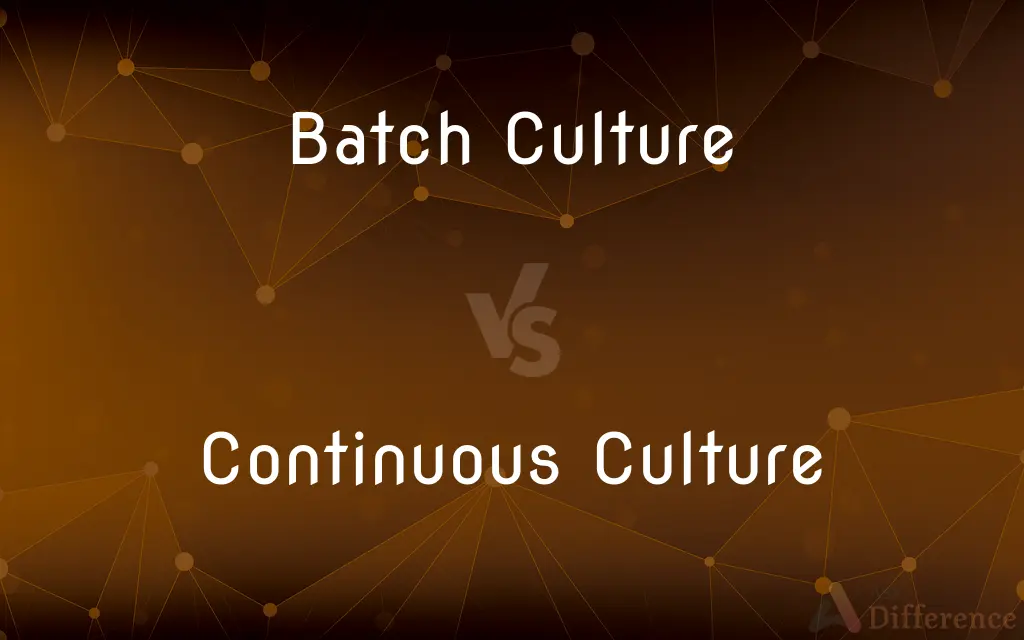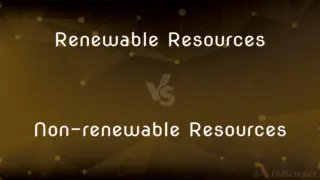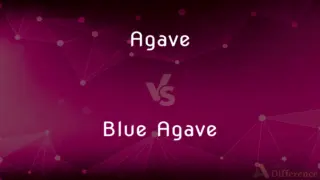Batch Culture vs. Continuous Culture — What's the Difference?
Edited by Tayyaba Rehman — By Fiza Rafique — Published on December 24, 2023
The Conscious Mind is aware and deliberate, while the Subconscious Mind operates automatically, housing memories and habits.

Difference Between Batch Culture and Continuous Culture
Table of Contents
ADVERTISEMENT
Key Differences
The Conscious Mind refers to our current thoughts and actions that we are actively aware of. The Subconscious Mind, on the other hand, contains information that lies below our current awareness, such as past memories and deep-seated beliefs.
Activities driven by the Conscious Mind require active attention and thought. Contrarily, the Subconscious Mind influences our actions and emotions without us being explicitly aware of these influences.
The Conscious Mind plays a role in immediate decision-making based on present situations. Meanwhile, the Subconscious Mind has stored past experiences and learned behaviors, affecting how we react to current situations.
Thoughts in the Conscious Mind are voluntary and can be controlled, allowing us to focus or divert our attention. In contrast, the Subconscious Mind contains involuntary thoughts and feelings, which sometimes surface without our intent.
Both the Conscious Mind and the Subconscious Mind play a pivotal role in shaping our behavior. The Conscious Mind helps us make active choices, while the Subconscious Mind provides an automatic response based on past learnings and experiences.
ADVERTISEMENT
Comparison Chart
Awareness Level
Actively aware of current thoughts and actions.
Operates below active awareness.
Control
Voluntary and can be directed.
Involuntary and automatic.
Influence on Behavior
Direct, based on current thought.
Indirect, based on past experiences.
Basis of Operations
Current situations and deliberate decisions.
Stored memories, habits, and beliefs.
Activity Requirement
Requires active attention and thought.
Does not require active attention, runs in the background.
Compare with Definitions
Batch Culture
The aspect of cognition responsible for current, active thought.
He pushed the thought to his Conscious Mind and contemplated deeply.
Continuous Culture
Contains involuntary thoughts and feelings that surface spontaneously.
An old memory popped up from her Subconscious Mind unexpectedly.
Batch Culture
The forefront of our mental processes that we can actively control.
By focusing his Conscious Mind, he managed to meditate amidst chaos.
Continuous Culture
The part of the mind that operates below our active awareness.
Her fear of spiders stemmed from her Subconscious Mind.
Batch Culture
Our immediate and real-time processing of information and surroundings.
Her Conscious Mind quickly assessed the danger and she ran.
Continuous Culture
The mental space influencing our behavior without explicit knowledge.
The Subconscious Mind sometimes guides our gut feelings.
Batch Culture
The part of the mind that is currently aware and active in thought.
He used his Conscious Mind to solve the complex math problem.
Continuous Culture
The backdrop of our psyche, affecting reactions and emotions.
Due to his Subconscious Mind, he felt uneasy in unfamiliar places.
Batch Culture
The mental space where deliberate and present decisions are made.
With her Conscious Mind, she decided to eat healthier.
Continuous Culture
The repository of memories, habits, and deep-seated beliefs.
His Subconscious Mind held the reason he disliked a particular song.
Common Curiosities
What is the Conscious Mind?
The Conscious Mind is the part of the mind that is actively aware and engaged in current thought processes.
Can we control our Subconscious Mind?
The Subconscious Mind operates automatically, but with techniques like therapy and meditation, we can influence its content.
How do habits relate to the Conscious Mind and Subconscious Mind?
While the Conscious Mind can initiate habits, they become ingrained and operate automatically in the Subconscious Mind.
Is intuition linked to the Subconscious Mind?
Yes, intuition often stems from the Subconscious Mind's stored experiences and knowledge.
How does the Conscious Mind affect decision-making?
The Conscious Mind plays a direct role in decision-making based on present situations and deliberate thought.
Why do certain memories suddenly appear without us thinking about them?
These memories surface from the Subconscious Mind, which can bring up stored information involuntarily.
How do dreams relate to the Subconscious Mind?
Dreams are believed to be a manifestation of the Subconscious Mind, reflecting its contents and feelings.
Can we train our Conscious Mind?
Yes, through focus, meditation, and practice, we can train our Conscious Mind for better concentration and thought processes.
Why do we have phobias or unexplained fears?
Phobias often reside in the Subconscious Mind, stemming from past experiences or learned behaviors.
How does the Subconscious Mind differ from the Conscious Mind?
The Subconscious Mind operates below our active awareness, storing memories and influencing behavior, while the Conscious Mind is actively aware.
Does the Conscious Mind only think about the present?
While the Conscious Mind is focused on the present, it can also deliberate on past experiences and future plans.
How significant is the role of the Conscious Mind in daily activities?
The Conscious Mind plays a pivotal role in daily activities, guiding our immediate decisions and actions.
Can the Conscious Mind override the Subconscious Mind?
With awareness and intent, the Conscious Mind can make choices that differ from the Subconscious Mind's inclinations.
How can I better understand my Subconscious Mind?
Techniques like introspection, therapy, and journaling can help access and understand the Subconscious Mind.
Can the Conscious Mind and Subconscious Mind work together?
Absolutely. They constantly interact, with the Conscious Mind making decisions and the Subconscious Mind providing automatic responses based on its content.
Share Your Discovery

Previous Comparison
Renewable Resources vs. Non-renewable Resources
Next Comparison
Agave vs. Blue AgaveAuthor Spotlight
Written by
Fiza RafiqueFiza Rafique is a skilled content writer at AskDifference.com, where she meticulously refines and enhances written pieces. Drawing from her vast editorial expertise, Fiza ensures clarity, accuracy, and precision in every article. Passionate about language, she continually seeks to elevate the quality of content for readers worldwide.
Edited by
Tayyaba RehmanTayyaba Rehman is a distinguished writer, currently serving as a primary contributor to askdifference.com. As a researcher in semantics and etymology, Tayyaba's passion for the complexity of languages and their distinctions has found a perfect home on the platform. Tayyaba delves into the intricacies of language, distinguishing between commonly confused words and phrases, thereby providing clarity for readers worldwide.











































